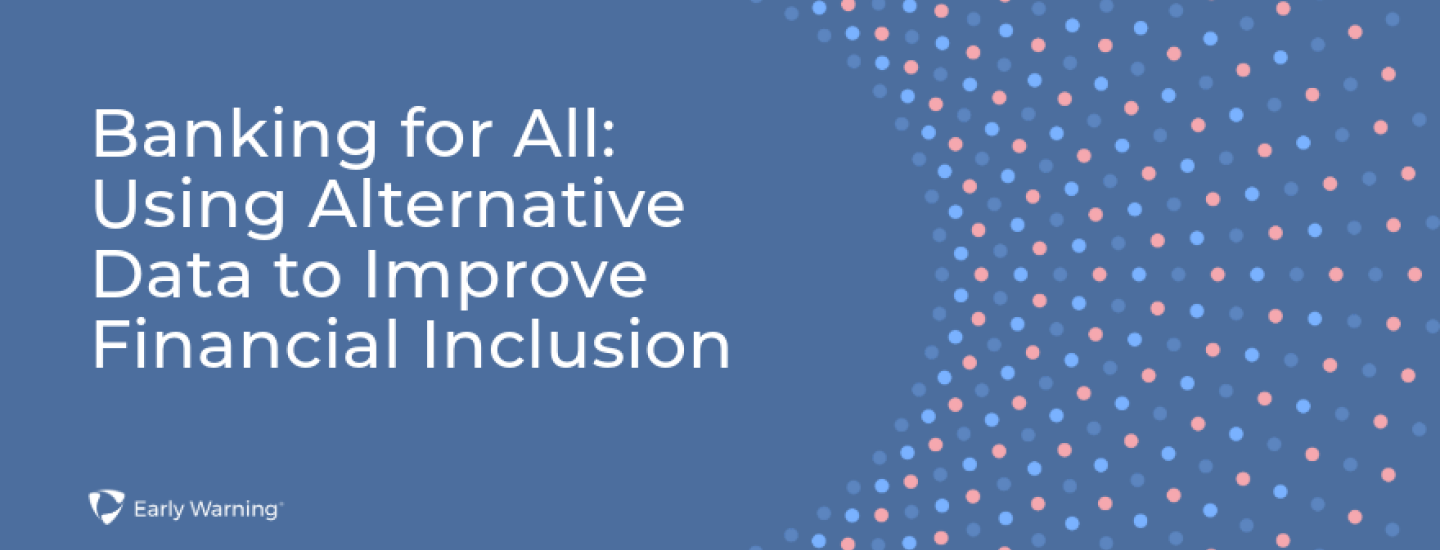A considerable portion of the U.S. population doesn't have fair and affordable access to financial services. Nearly 50 million Americans1, disproportionally comprised of poor and minority communities, cannot fully participate in our nation's banking system because they don't have credit history.
For banks looking to improve financial inclusion, expanding access to credit is a good place to start.
Without credit history and a score on file with one of the primary credit bureaus (Equifax, Experian, and TransUnion), it can be nearly impossible to get approved for mainstream lending products—from credit cards and auto financing to mortgages and business loans. Basing a person’s creditworthiness on credit scores alone, however, is an outdated model that perpetuates a cycle of disadvantage. It deepens financial divides and further hinders opportunities for success among historically underserved communities.
For example, individuals who can't obtain credit through traditional banking channels may need to depend on non-traditional lending services, like payday loans, to obtain the funds they need. In addition to having higher-than-normal interest rates, these types of loans typically don’t help a person build credit because payday lenders may not report their loans to the credit bureaus. So, even if the individual repays the loan on time, the responsible behavior may not positively impact their credit history.
Improving financial inclusion in banking can help reduce income inequality and poverty, while strengthening the economy. Fairer access to credit gives more people the opportunity to invest in their education, start a business, buy a home—and generally contribute to the nation’s economic progress.
Bank regulators are pushing new strategies for financial inclusion.
Financial inclusion remains an ongoing priority among banking regulators. Several governing bodies—including the Consumer Financial Protection Bureau, the Office of the Comptroller of the Currency (OCC), and the Federal Deposit Insurance Corporation—are taking a more holistic approach to tackle the issue.
Regulators are urging banks to embrace financial inclusion as a foundational principle of corporate social responsibility. The goal is to create a more evolved banking model where everyday banking practices are designed to promote inclusivity. To this end, some banks have taken steps to reduce minimum balance requirements, offer lower-cost account options and minimize fees. While these types of changes are helpful, they are just the beginning.
Building a truly inclusive financial environment requires sustained commitment and cooperation from stakeholders across the industry. An example of this is the Roundtable for Economic Access and Change (REACh). Spearheaded by the OCC, Project REACh aims to remove economic barriers for underserved communities.
Alternative data helps expand access to financial services.
One way Project REACh seeks to improve financial inclusion in banking is by reforming the systems used to determine a person’s creditworthiness.
The initiative’s Alternative Credit Assessment Workstream brings together leaders from banks, nonprofits and fintech companies to collaborate on new methods for consistently predicting a consumer's ability to repay a loan. Data and analytics are central to these efforts.
Expanding the types of data used to make credit decisions is key to improving financial inclusion. People without credit scores often have other data available that can help lenders assess their level of risk and ability to make payments. Examples include income, rental payment histories, bill pay transactions and other banking patterns. Alternative data can give financial institutions (FIs) the insights they need to identify consumers who demonstrate responsible financial management behavior but who are invisible under traditional credit evaluations.
Going a step further, by combining broad and deep data sets with advanced analytics, FIs can better understand how different customer segments use their banking services—and then tailor their offerings to meet the needs of underserved populations.
Early Warning® helps banks make credit more accessible.
As the Trusted Custodian® of the National Shared DatabaseSM resource, Early Warning has access to timely data from thousands of financial institutions.
Since July 2020, we have contributed to the Alternative Credit Assessment Workstream within Project REACh. Expand Credit Insights—an Early Warning service developed in support of the OCC initiative—provides participating institutions with summarized deposit account data on consumers with little or no credit history. With comprehensive and trusted alternative data, FIs can gain insights into a person’s financial health, history and behavior—to enable a more inclusive credit decisioning strategy.
Banks that strive to make their products and services more accessible and inclusive can cater to new markets and drive business growth—while promoting a fairer financial system.
To learn more about using account data to supplement credit lending decisions and improve financial inclusion in banking, visit our website.
Sources
